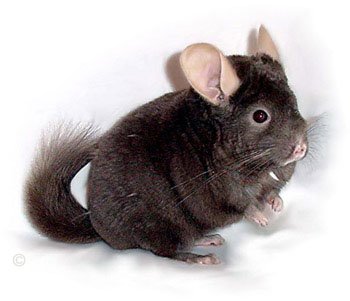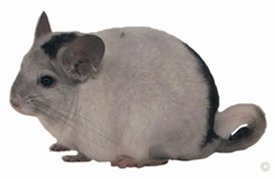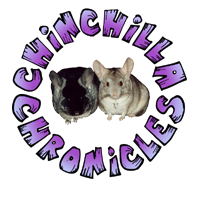
Chinchilla care is the most important aspect of looking after chinchillas and covers a multitude of topics.
To care for a chinchilla properly, you must first be fully educated about these tiny balls of fluff before you purchase one and understand what their basic requirements are.
This website can help you with that as we have included separate segments (links) on each chinchilla care topic and offer basic advice, guidance and recommendations in regard to a particular subject.
- Buying a Chinchilla - As soon as you decide to buy a chinchilla, the principals of care begin by ensuring you purchase a healthy and strong chinchilla in the first instance. This section goes into detail about what you should look out for and a basic overview of the chinchilla so you can decide if this is the correct type of pet for you.
- Nutrition (Food & Diet) - The foundation of chinchilla care lies in nutrition. If a chinchilla is not provided the correct nutrition, health problems will begin early in the chinchilla's life. This segment goes into the basic nutritional requirements of a chinchilla and has further links on Supplementation, Safe Treats, Forbidden Treats, Safe and Dangerous Wood.
- Sounds and Postures - Caring for a chinchilla is easy when you understand what a chinchilla is trying to say through their vocal sounds and postures. Although there are many vocal sounds and various postures, this section explains a few of the most common vocal sounds and includes external links so you can listen to real life chinchilla vocal sounds!
- Taming a Chinchilla - It is easier to care for a chinchilla when they are tame and used to being handled. We have included three sections: Taming, Holding and Catching a Chinchilla for you to review and learn the techniques to help train your chinchilla and build a bond of trust between the two of you.
- Chinchilla Exercise - One of the best ways to show you care for your chinchilla is to allow them plenty of free exercise outside their cage on a daily basis. Caring for a chinchilla in this way will give them a sense of freedom and well-being. This section informs you of the dangers of exercising chinchillas and how to do it in a safe manner.
- Chinchilla Cage - One of the most important areas of chinchilla care will be their cage set up as a chinchilla will spend most of its life within the cage environment. This link provides information on the various cage types, together with cage essentials a chinchilla will need.
- Toys & Accessories - Gnawing toys and accessories are invaluable to chinchilla's teeth and provide lots of entertainment during a chinchilla's waking hours. To care for a chinchilla properly, you must ensure your chinchilla has plenty of items to gnaw on whilst inside and also outside of the cage environment. This sections offers ideas and lists the best toys you can provide your chinchilla.
- Introducing Chinchillas - If you are planning on having more than one chinchilla living in a cage, then the importance of care will lie to both chinchillas to ensure they live happily together and not fight. Introducing Chinchillas explains the correct way to bring two chinchillas together and the care they will need as a couple.
- Breeding Chinchillas - Breeding chinchillas is a complex subject as the care of a chinchilla will not only lie with the mother but also the unborn foetuses. This link covers all the basic aspects of care whilst breeding chinchillas to ensure the chin-mum has a trouble-free pregnancy producing healthy and happy offspring.
- Chinchilla Birth - A time when many owners may panic, Chinchilla Birth informs you of what to expect and the care a chinchilla will need if birthing complications a rise.
- Weaning a Chinchilla Baby - Chinchilla babies (kits) need different care to adult chinchillas if they are to grow into healthy chinchillas. The levels of care is explained in this chapter, which also informs you of the best way and time to separate kits from their mothers.
- Chinchilla Health - Keeping a close eye on a chinchilla's health is the best way to care for your chinchilla. It is easier to care for a chinchilla whilst they are healthy but more complexed in times of illness. Chinchillas can go downhill rapidly when they are unwell and you will need to provide a different level of care during this time. Chinchilla Health give a basic overview on things to look out for and describes some common ailments.
- Examining a Chinchilla - Examining a chinchilla on a weekly basis will help prevent illnesses going unnoticed and becoming life threatening. This link discloses all the common areas you should examine a chinchilla and how to perform this task successfully.
- Illness, Sickness & Disease - A time when chinchilla care is of utmost importance. If you do not get the chinchilla's care correct at this time then a chinchilla will go down hill seriously rapidly! This section talks about some of the various illnesses a chinchilla can acquire and how to care properly for a chinchilla during this vital time.
- Male Castration - Caring for a chinchilla extends to the responsibility of not introducing baby chinchillas into the society that may become unwanted. Male Castration explains why a chinchilla may be castrated/neutered and the care that should be taken during the operation and also the after-care that is needed.
- Chinchilla Teeth - This section of chinchilla care has been included because the most common disorder in chinchillas is with their teeth. The section has been incorporated to illustrate the different ailments there are regarding chinchilla teeth and how to spot the symptoms of a specific tooth issue.
Chinchilla Care Is Simple & Unproblematic Providing You Follow A Few Key Rules:
- Provide only the three basic essentials to a chinchilla on a daily basis: hay, pellets and water.
- Never offer pellets made for other animals, only pellets made for chinchillas should be provided.
- Do not offer treats on a regular basis and when you do, ensure they are safe treats.
- Always make sure there are plenty of items for a chinchilla to gnaw on.
- Keep the room quiet during sleeping hours and at a constant temperature regulated at 65°-75°F.
- Allow a chinchilla daily activity outside its cage environment for at least 1-2 hours per night.
- Offer a dust bath each day or every other day and also keep an eye on the chinchilla's skin condition.
- Provide a chinchilla cage large enough for the amount of chinchillas you will be housing and every week clean the cage thoroughly.
- Take a chinchilla to a veterinary surgeon every six months for a dental check-up and a yearly head X-ray.
- Examine chinchillas on a weekly basis to prevent underlying illnesses going unnoticed.
- Ensure no harm can come to a chinchilla especially inside or outside their cage environment.
- Always interact and acknowledge your chinchilla and never shout, chase or scare them.
There Are A Few Products You Will Need To Get You Started In Providing Good Chinchilla Care:
- Large chinchilla cage.
- Sturdy Food Bowl or a bowl that clips onto the inside of the cage.
- Nest box
 Hay
Hay- Chinchilla Pellets
- Water Bottle
- Bottle Brush
- Dust Bath
- Chinchilla Dust
- Gnawing Material
- Toys (large tubes and wooden toys)
- Cage Cleaning Products
- Chinchilla Books
All the above products can be purchased via you local pet shop and should be bought and prepared before your chinchilla's arrival. There are many chinchilla books available in book shops or on line, which will help educate you further with regards to Chinchilla Care.
This website sells a selection of chinchilla books all written by top chinchilla author Mirella Poli. Her first chinchilla book - An Essential Guide to Owning a Chinchilla is now on its second print run selling over 4,000 copies worldwide! This fantastic hardback book is great for any chinchilla owner new or old and covers all aspects of chinchilla care together will beautiful colour photographs strewn throughout. Read More...
The Chinchilla A-Z Health & Sickness Bible is like no other chinchilla book out there and lists over 150+ different illnesses to look out together with the symptoms and cures for various diseases. This amazing ebook is a 'must' for anyone wanting to care for their chinchilla properly and especially during times of sickness or disease. Remember, with chinchillas, prevention is easier than trying to find a cure! Read More...
The chinchilla Mini Book Series are self printed booklets on a specific subject matter to enable the reader to be further educated on their chosen subject. The range includes Home Remedies and Safe Medications, Chinchilla Anatomy, Vitamins and the Relation to Chinchilla Disease and Minerals and the Relation to Chinchilla Disease and are a 'must-have' for any chinchilla library.
Further Reading Relating To Chinchilla Care:
Home Remedies and Safe Medications, Chinchilla Anatomy, Vitamins and the Relation to Chinchilla Disease, Minerals and the Relation to Chinchilla Disease.



 Hay
Hay